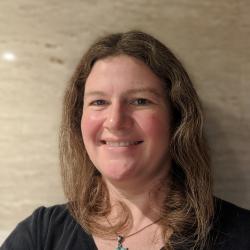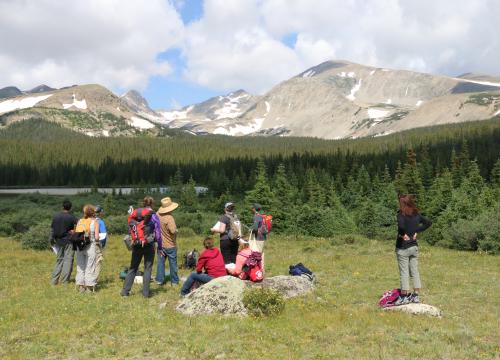Bec Batchelor
Rebecca (Bec) Batchelor is an atmospheric scientist and educator with a focus on mentoring, undergraduate research, and building supportive communities to increase participation in STEM. A proud Kiwi, Bec did her PhD research in atmospheric physics at the University of Canterbury in Christchurch, New Zealand. Her research career led her to spending more than three years in the Antarctic and Arctic, working in Canada and the US. Over the last ten years she has turned her focus to diversity and inclusion in education, running the Significant Opportunities for Atmospheric Research and Science (SOARS) program at the National Center for Atmospheric Research in Boulder Colorado, serving as a Co-PI of the Sparks for Change project focused on supporting early career minority faculty, and most recently, serving as an adjunct professor in support of the Puerto Rican Outstanding Undergraduate Diversified Program at the University of Puerto Rico Humacao, where her focus is on faculty development.
University of Canterbury Christchurch, New Zealand Physics BSc (Hons) 2002
University of Canterbury Christchurch, New Zealand Physics PhD 2005
University of Toronto Toronto, Canada Atmospheric Physics 2006-2009
National Center for Atmospheric Research Boulder, CO Atmospheric Physics 2010-2012
2020 – current Research Associate, CIRES Education & Outreach, University of Colorado at Boulder
2019 – current Adjunct Professor – Biology, Puerto Rican Outstanding Undergraduate Diversified Program, University of Puerto Rico - Humacao
2017 – 2018 Program Director, Significant Opportunities in Atmospheric Research and Science (SOARS), UCAR Center for Science Education
University Corporation for Atmospheric Research (UCAR), Boulder, CO.
2012 – 2017 Education Specialist, UCAR Center for Science Education
University Corporation for Atmospheric Research (UCAR), Boulder, CO.
2010 – 2012 Postdoctoral Scientist, Atmospheric Chemistry Division
University Corporation for Atmospheric Research (UCAR), Boulder, CO.
2006 –2009 Postdoctoral Fellow, Department of Physics
University of Toronto, Toronto, Canada.
2005 – 2006 Research Associate, McMurdo Station, Antarctica
Raytheon Polar Services, under contract to the US Antarctic Program.
- Leadership team for the HHMI Inclusive Excellence funded Puerto Rican Outstanding Undergraduates Diversified (PROUD) Program at University of Puerto Rico Humacao (2019-current)
- Co-PI of the NSF GOLD: Sparks for Change program aimed at supporting early career minority faculty and empowering cultural change toward broadening participation with small groups, NSF Award # 1645453 (2016-current)
- Former staff, scientific writing and professional development coordinator, Co-PI, and Director of the Significant Opportunities in Atmospheric Research and Science (SOARS) program, an undergraduate to graduate bridge program for broadening participation in the atmospheric and related sciences, NSF Awards #1641177 and #1120459 (2012-2018)
- Team member and writing workshop facilitator for the NSF REU site: Research Experience for Community College Students (RECCS) in Critical Zone Science, NSF Award #1461281 (2015-2018) and mentor for the current RECCS grant.
- AMS Education Symposium Planning Committee and session chair, (2017-2019)
American Society for Engineering Education. 2020: Cultivating Diversity Champions: Practices and Lessons from Two NSF Geoscience Opportunities for Leadership In Diversity (GOLD) Projects. Washington, DC; Chapter 3 pp 22-33, authors: R. Kirsch, R. L Batchelor, J. Crockett, B. King, and S. Habtes, available at https://www.asee.org/documents/publications/reports/2019-Cultivating-Diversity-Champions-GOLD.pdf
Batchelor, R. L., Habtes, S., Chen, J., 2019: Promising Approaches to Increasing the Engagement and Retention of Underrepresented Minorities: Insights from the NSF GOLD Program, American Society for Engineering Education Webinar 12/2019, available at https://www.asee.org/education-careers/continuing-education/webinars
Burt, M. A.; Haacker, R, Batchelor, R. L., and Denning, A.S., 2016: Increasing the Diversity of Your Graduate Program: Translating Best Practices into Success. Bull. Amer. Meteor. Soc., 97, 1169–1172, doi: 10.1175/BAMS-D-15-00004.1.
Sloan, V., Haacker, R., Batchelor, R. L., & Burt, M. A. 2018: Preparing Mentors for Research Internship Roles, American Geophysical Union, Fall Meeting 2018, abstract #ED21C-0908
Bonine, K. E.., Dontsova, K., Batchelor, R.L., Brinkworth C., 2018: Immersive Undergraduate Research Experiences: Maximizing Benefits for Diverse Students, American Geophysical Union, Fall Meeting 2018, abstract #ED21C-0908
Batchelor, R. L., Crockett, J., Kirsch, R., King, B., Habtes, S. 2018: Sparks for Change: Supporting and Retaining Minority Faculty in the Geosciences, American Meteorological Society Annual Meeting, Austin, January 2018.
Kirsch, R., Batchelor, R.L. Habtes, S., King, B., Crockett, J., 2017: Small Groups, Big Change: Preliminary Findings from the Sparks for Change Institute, American Geophysical Union Fall Meeting 2017, abstract #ED22B-07
Batchelor, R. L., F. Kolonjari, R. Lindenmaier, R. L. Mittermeier, W. Daffer, H. Fast, G. Manney, K. Strong, K. A. Walker, 2010: Four Fourier transform spectrometers and the Arctic polar vortex: Instrument intercomparison and ACE-FTS validation at Eureka during the IPY springs of 2007 and 2008, Atmos. Meas. Tech., 3, 51-66.
Batchelor, R. L, Strong, K., Lindenmaier, R., Mittermeier, R., Fast, H., Drummond, J. R., Fogal, P. F., 2009: A new Bruker IFS 125HR FTIR spectrometer for the Polar Environment Atmospheric Research Laboratory at Eureka, Canada - measurements and comparison with the existing Bomem DA8 spectrometer, J. Atmos. Oceanic Technol. 26, 7, 1328-1340, doi: 10.1175/2009JTECHA1215.1.
Fisher, J. A., Jacob, D. J., Purdy, M. T., Kopacz, M., Le Sager, P., Carouge, C. C., Holmes, C. D., Yantosca, R. M., Batchelor, R. L., Strong, K., Diskin, G. S., Fuelberg, H. E., Holloway, J. S., Hyer, E. J., McMillan, W., Warner, J., Streets, D. G., Zhang, Q., Yang, Y. & Wu, S. 2010. Source attribution and interannual variability of Arctic pollution in spring constrained by aircraft (ARCTAS, ARCPAC) and satellite (AIRS) observations of carbon monoxide. Atmospheric Chemistry and Physics, 10 (3), 977-996.



